
It’s great to find this aperitif sized delicacy in the library. A short story of approximately 50 pages So Late in the Day was first published in the New Yorker in 2022. The brevity means you can readily read this vignette in an afternoon. So Late in the Day follows an afternoon and evening with Cathal as he contemplates a series of actions he’s taken and what their impact has been on the rest of his life.
Ultimately, this is a story of misogyny. Not in the extreme sense depicted in Adolescence but a subtler, more pervasive erosion of character. A type of behaviour that’s some sort of indigestible hangover from the Victorian era, represented most memorably in a retelling of a scene from Cathal’s childhood. Here, his mother serves up the food to the expectant men at the table only to then have her chair kicked out from under her as she tries to sit. He, his brother and father all laugh while she picks up the broken plates and food. In the present day, Cathal reflects upon whether he’d have turned out differently had his father been someone else. The question he ruminates on highlighting the importance of upbringing. So there’s the problem; the malleable nature of children – how they absorb the actions of their parents. What then is the solution?
Ten years ago in 2015 all Swedish children were reported to have been given a copy of Chimamanda Ngozi Adichie’s essay We Should All Be Feminists. I think you could add So Late in the Day to that prescription. But is this enough? We can hope that exposure to counterweights in Keegan and Adichie, to name but two, would start to balance against the right-wing adjacent manosphere. I’m not sure if balance is sufficient; should an excess of all that teaches balance and compassion be central? We need more literature like this to be central in the classroom, to be given the slow time to think and, ideally, outcompete the undesirable rhetoric found too easily in the sadder corners of the internet. Foster by Keegan has been taught as part of the Irish leaving certificate and shows us all an example of the power of literature in the younger dynamic minds.
Through Cathal’s love interest, Sabine, Keegan summarises her simple, central message for this work:
‘It’s about not giving’
This is an important point about equality and how particularly in relationships and family units, not sharing the load fairly and treating everyone as equals wears the connections away until there is nothing left.
As usual with Keegan, the pacing and choice of language is exquisite. A customary slow build leads to a subtle reveal of Cathal’s current existence. I have very much enjoyed 2025 as the year of reading Claire Keegan.
D